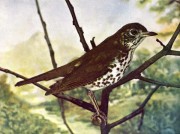Some more academic work, but rather basic. There are a lot of introductions to Charles S. Peirce’s sign theory out there, but I had to do one of my own in order to have some raw material to support points I’m making elsewhere. So you get the benefit of it if you so desire! Peircean semiotic has been a very important theoretical undergirding for my approach to composition, and in particular my approach to teaching science and nature writing, but I haven’t had much opportunity until recently to start demonstrating where and how. It was very trendy in the academy not that long ago, and still may be, but I no longer pay any attention to what is or isn’t. In any case, the engagement then was rather superficial, and the usefulness of his theory has hardly been scratched.
Let’s begin.
Semiotic, or semiotics, or even semiology, is the study of signs in communication. The differences in the name indicate the different inheritances and legacies of theoretical traditions, the later two deriving from the major Francophone legacies, those represented by Roland Barthes and Ferdinand de Saussure. I’ll be describing the basics of Peirce’s model of how signs function, and so prefer his term, semiotic.
I am chiefly indebted for my understanding and application of the sign theory specifically to the following two works:
Floyd Merrell. Pierce, Signs, and Meaning. Toronto: U of Toronto P, 1997.
Also, in many respects this one:
The key thing in the Peircean model is to remember to think of things in threes. Peirce was a Kantian at heart, and a formal architectonic system that would use some basic formal relations to describe all human experience was always his goal. Through introspection, systematic analysis, and extensive reworking and revision of his basic model, he arrived at three irreducible formal categories for the functions of the sign and three corresponding phenomenological categories for the process and experience of signification.

